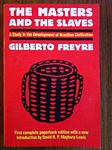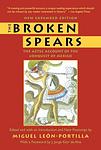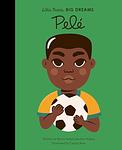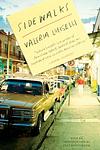The Greatest Mexican, Brazilian "Nonfiction" Books Since 1900
Click to learn how this list is calculated.
This list represents a comprehensive and trusted collection of the greatest books. Developed through a specialized algorithm, it brings together 300 'best of' book lists to form a definitive guide to the world's most acclaimed books. For those interested in how these books are chosen, additional details can be found on the rankings page.
Genres
Countries
Date Range
Reading Statistics
Click the button below to see how many of these books you've read!
Download
If you're interested in downloading this list as a CSV file for use in a spreadsheet application, you can easily do so by clicking the button below. Please note that to ensure a manageable file size and faster download, the CSV will include details for only the first 500 books.
Download-
1. The Labyrinth of Solitude by Octavio Paz
This book is a profound and vivid exploration of Mexico's character, culture, and identity. The author delves into Mexico's history, politics, and psyche, examining the country's deep solitude and its impact on the national character. The book provides a comprehensive analysis of Mexican society, its myths, symbols, and rituals, offering a deep understanding of the Mexican people's unique way of perceiving the world. It also discusses the influence of the United States on Mexico and the complex relationship between the two countries.
-
2. Rebellion In The Backlands by Euclides da Cunha
This book offers a detailed and vivid account of the War of Canudos, a significant peasant revolt that took place in the late 19th century in the Brazilian backlands. Through a blend of historical documentation and narrative, the text explores the socio-political conditions that led to the uprising, the charismatic leadership of Antônio Conselheiro, and the brutal suppression of the rebellion by the Brazilian government. The author delves into the geography, culture, and lives of the backland inhabitants, providing a deep analysis of the conflict as a reflection of the broader struggles within Brazilian society. This work is not only a historical account but also a profound commentary on the themes of civilization versus barbarism, social injustice, and the complexities of national identity.
-
3. Child Of The Dark by Carolina Maria De Jesus
The book is a powerful and harrowing diary that provides an unflinching look at the brutal realities of life in the favelas of São Paulo, Brazil, through the eyes of a struggling single mother. The author documents her daily fight for survival and that of her children, as they contend with hunger, poverty, and the constant threat of violence. Her poignant observations and raw emotional honesty offer a deeply personal insight into the systemic social injustices and the resilience of the human spirit in the face of overwhelming adversity.
-
4. Os Nacionalismos Africanos by Mario de Andrade
"Os Nacionalismos Africanos" explores the rise of African nationalism during the mid-20th century, delving into the various factors that fueled the movement across the continent. The book examines the impact of colonialism, the emergence of Pan-Africanism, and the struggles for independence experienced by African nations. Through a meticulous analysis of historical events and political ideologies, the author provides a comprehensive understanding of the complex dynamics that shaped African nationalism and its enduring legacy in the post-colonial era.
-
5. The Masters and the Slaves by Gilberto Freyre
This book is a sociological and anthropological study of 19th century Brazil, focusing on the relationship between the Portuguese colonists and the African slaves. It delves into the racial and cultural synthesis that occurred, resulting in the unique Brazilian identity. The book is known for its controversial assertion that the Portuguese colonizers were more humane and less racist than their North American counterparts, leading to a more harmonious racial integration in Brazil.
-
6. The Broken Spears by Miguel Leon-Portilla
"The Broken Spears" presents a poignant account of the Spanish conquest of the Aztec Empire from the perspective of the indigenous people. Through a compilation of Nahuatl texts, the book offers a narrative that contrasts sharply with the traditional European-centered histories. It highlights the devastating effects of Spanish conquest on the Aztec civilization, including the significant cultural and human losses suffered due to violence and disease. The work provides a voice to the Aztec people, showcasing their courage, complexities of their society, and the tragic impact of colonialism.
-
7. Pedagogy Of The Oppressed by Paulo Freire
This book is a seminal work in the field of critical pedagogy that explores the complex relationship between the oppressor and the oppressed in educational contexts. The author argues that traditional pedagogical methods perpetuate existing hierarchies and suggests a new approach called "problem-posing education," which emphasizes dialogue and critical thinking to empower learners to question and challenge oppressive systems. The text is both a critique of the way education is often used as a tool of domination and a guide for how it can instead be transformed into a practice of freedom, helping individuals to achieve self-realization and societal change.
-
8. My Life And The Beautiful Game by Pele
The book is an autobiography by one of the greatest soccer players of all time, who shares his journey from the streets of Brazil to becoming a global sports icon. The narrative delves into his profound love for soccer, detailing his career highlights, personal life, and the challenges he faced along the way. It also explores his role in popularizing soccer across continents and his enduring impact on the sport, providing insights into his philosophy both on and off the pitch. The autobiography is not only a reflection on his illustrious career but also an inspirational story of dedication, passion, and the transformative power of sports.
-
9. Mexico: Biography of Power by Enrique Krauze
This book offers a comprehensive exploration of the political and social evolution of Mexico, tracing the country's history from the pre-Columbian era to the late 20th century. It delves into the lives and legacies of Mexico's influential leaders, examining how their exercise of power shaped the nation's identity and destiny. The narrative weaves through the complexities of Mexico's revolutions, reforms, and relationships with external powers, providing a deep understanding of the forces that have defined the country's path and the characters who have stood at the helm of its journey. Through a blend of biography and historical analysis, the work presents a vivid portrait of a nation's struggle for sovereignty, stability, and self-definition.
-
10. Tell Me How It Ends: An Essay in 40 Questions by Valeria Luiselli
This book is a powerful exploration of the critical issue of child immigration, focusing on the experiences of Central American children who arrive in the United States without their parents. The narrative is structured around 40 questions that the author, as a court interpreter, must ask the children to help determine their fate. The book provides a deeply personal and moving account of the human stories behind the ongoing debate over immigration and asylum laws.
-
11. Pele: The Autobiography by Pele
In this autobiography, the legendary Brazilian footballer recounts his journey from a young boy with a passion for the game to becoming one of the most iconic figures in the sport's history. He shares insights into his upbringing, the challenges he faced, and the triumphs he experienced throughout his illustrious career. The book delves into his record-breaking achievements, including three World Cup victories, and his role in popularizing football across the globe. It also offers a personal look at his life off the pitch, including his contributions to various social causes and the legacy he hopes to leave behind for future generations of athletes.
-
12. Sidewalks by Valeria Luiselli
"Sidewalks" is a collection of essays that delve into the themes of urban spaces, memory, and identity through the lens of the author's experiences in different cities around the world. The narrative weaves together personal reflections, literary criticism, and philosophical musings, offering a unique perspective on the ways in which the physical landscapes of cities intersect with the internal landscapes of our minds. Through her explorations of sidewalks, cemeteries, and other urban spaces, the author invites readers to consider the profound connections between place, history, and the self, making this work a thoughtful meditation on the nature of belonging and the transient essence of life.
Reading Statistics
Click the button below to see how many of these books you've read!
Download
If you're interested in downloading this list as a CSV file for use in a spreadsheet application, you can easily do so by clicking the button below. Please note that to ensure a manageable file size and faster download, the CSV will include details for only the first 500 books.
Download









